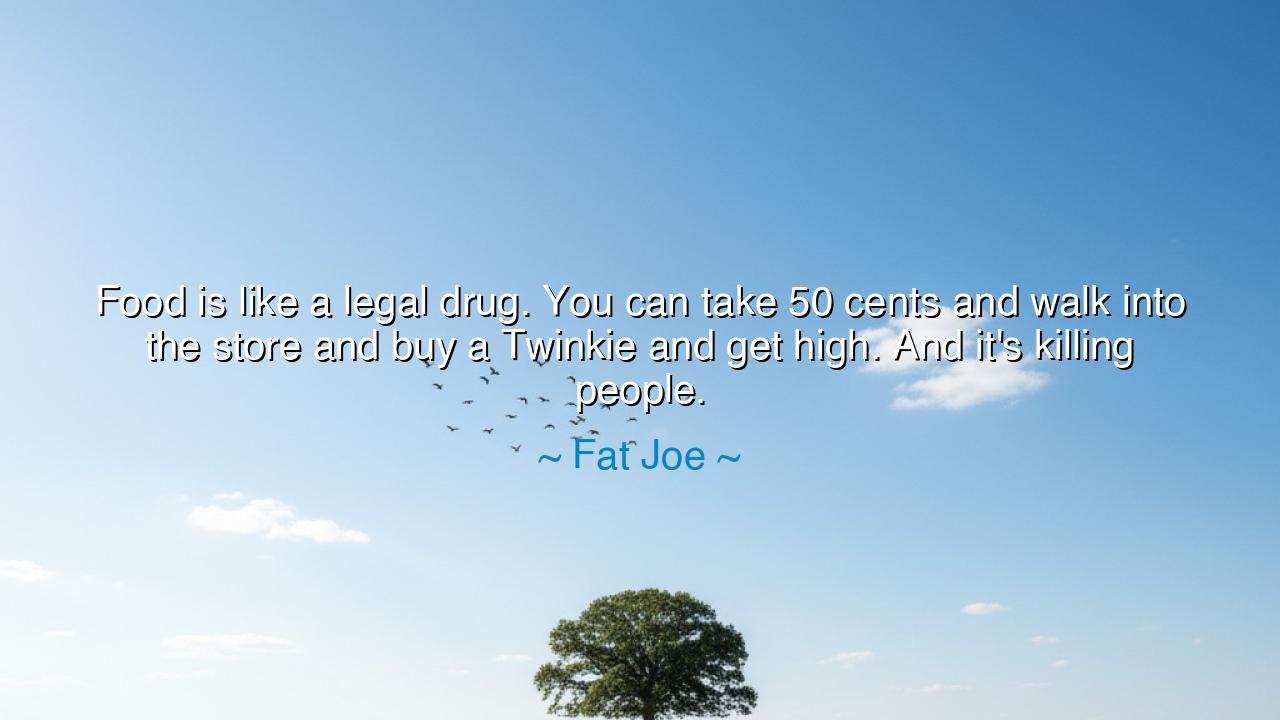
Food is like a legal drug. You can take 50 cents and walk into
Food is like a legal drug. You can take 50 cents and walk into the store and buy a Twinkie and get high. And it's killing people.






The words of Fat Joe — “Food is like a legal drug. You can take 50 cents and walk into the store and buy a Twinkie and get high. And it's killing people.” — are not merely the lament of an artist, but the cry of a man who has witnessed the seduction of modern pleasure and the quiet decay it brings. Beneath his casual tone lies a truth that cuts deep into the heart of our age: that addiction is no longer found only in the forbidden substances of the underworld, but also in the brightly lit aisles of the supermarket. Food, once sacred as the sustenance of life, has been transformed into a weapon of indulgence — a legal poison wrapped in sugar and salt, engineered to enslave the senses and dull the mind.
In this quote, Fat Joe speaks not as a philosopher of ancient times but as a prophet of the modern one. Having himself battled with obesity and the struggle to reclaim his health, he understands how food can become an instrument of destruction, disguised as comfort. His comparison of food to a “legal drug” reveals how deeply corporations have mastered the science of addiction. With a few coins — the price of a Twinkie, a soda, or a bag of chips — one can purchase a fleeting moment of bliss, followed by a long shadow of sickness. This is not the hunger of the body, but of the spirit — the hunger that never ends because it is fed with emptiness.
The origin of this reflection lies in the story of abundance turned against itself. In the ancient world, food was revered; it was shared as a sign of community, blessed before eaten, and valued as the foundation of strength. Civilizations rose around grain, salt, and water — symbols of life itself. But in our time, abundance has become excess, and what once nourished now corrupts. Fat Joe’s words echo the warning of the old philosophers, who cautioned that when desire rules man, even blessings become curses. Gluttony, one of the oldest sins, has evolved into a system — not of individual weakness, but of industrial design.
There is a powerful irony in the phrase “legal drug.” For in every civilization, the rulers have sought to outlaw the substances that destroy their people — opium, cocaine, liquor. Yet now, the most destructive narcotic of all is one the law not only allows, but promotes. The modern diet, rich in sugar, refined grains, and chemicals, feeds disease as surely as smoke feeds fire. Diabetes, heart disease, and obesity have become the plagues of our time, not born from famine but from feasting. And like all plagues, they thrive not in the dark corners of society, but in its center — in schools, offices, homes, and the quiet kitchens of those who believe they are simply feeding their families.
History has seen this before, though under different guises. The Roman Empire, at the height of its power, drowned in its own indulgence. The emperors of old built lavish feasts that lasted for days, where tables overflowed with meats, wines, and sweets. Yet while they fed on pleasure, the strength of the Republic withered. Bread and circuses replaced discipline and virtue, and in their gluttony, they lost the spirit that had once made them great. So too, Fat Joe’s warning echoes through time: that a nation which consumes without conscience will grow weak — not in body alone, but in will, in mind, and in soul.
But his words are not a condemnation without hope. Beneath their sting lies a call to awareness — a plea to awaken from the numbness that modern convenience has cast upon us. Food, he reminds us, should be sacred again. It should be an act of life, not a slow death. To eat mindfully is to reclaim power from the forces that profit from ignorance. To reject the “legal drug” is not to reject pleasure, but to rediscover joy — the joy of true nourishment, the sweetness of fruit that grows from the earth, the satisfaction of a meal made with care.
Let this be the lesson carried forward: beware the pleasures that come too cheaply, for they often demand a hidden price. The modern world sells intoxication disguised as comfort, but those who live wisely must learn to see beyond the shine of the wrapper and the rush of sugar. Strength begins not in the gym, but at the table; health begins not in medicine, but in choice. Let food once again be seen as the gift of life, not the slow poison of excess.
So remember the wisdom in Fat Joe’s words — not merely as a warning, but as a path. The same hands that reach for poison can also reach for healing. The same mouth that craves destruction can speak gratitude before nourishment. And the same world that feeds addiction can, through awareness and discipline, rediscover the sacred art of eating well. For food is power — and in how we use that power lies the difference between life and death, between slavery and freedom.






AAdministratorAdministrator
Welcome, honored guests. Please leave a comment, we will respond soon